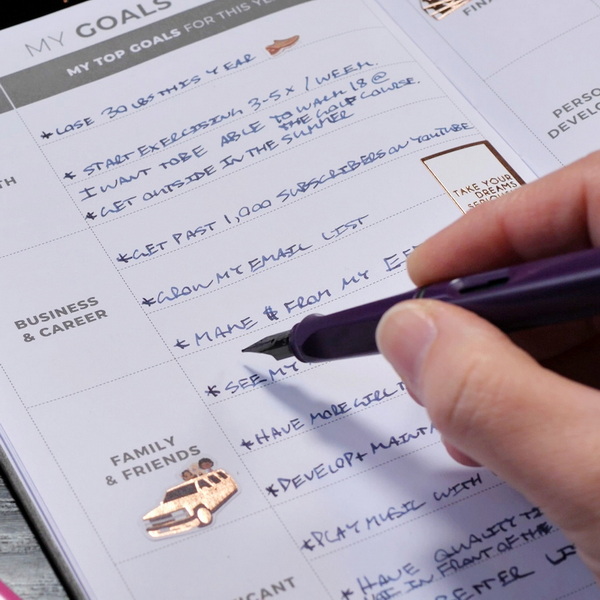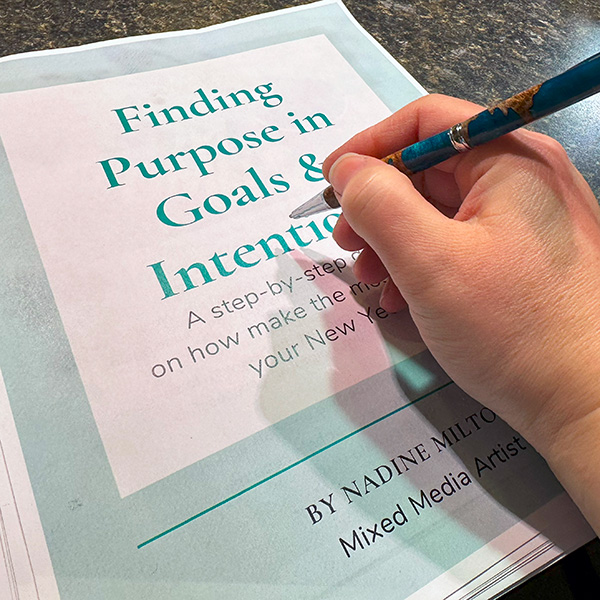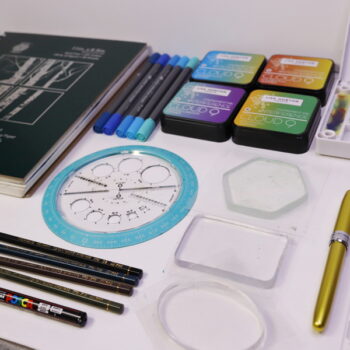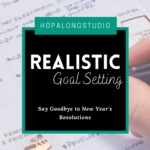
Realistic Goal Setting and New Year’s Resolutions
As 2020 is just around the corner, the topic of realistic goal setting and New Year’s Resolutions comes up in conversation. Goal setting can be a struggle for me, but not because I’m unmotivated. On the contrary, one of my strengths is achieving. I tend to set impossible goals or have too many goals.
For goal setting to be effective we must set realistic goals in a way that does not bring stress or guilt. Instead it should bring inspiration and motivation. Goal setting does not have to cause anxiety or be discouraging. It can be a powerful tool to help you meet your goals without punishing yourself.
Hop-A-Long Studio is reader-supported. When you buy through links on our site, we may earn an affiliate commission at no cost to you. Learn more.
Why Goal Setting Doesn’t have to Cause Anxiety
At the end of last year I happened to see one of Michael Hyatt’s free webinars about goal setting and I found it really illuminating. It showed me how goal setting doesn’t have to cause anxiety or be discouraging. Through it came some realizations on how my goal setting needed to change. Goal setting can be something positive instead of a process leaving me feeling guilt-ridden and discouraged.
Setting Yourself Up for Success
Setting realistic goals is much easier said than done. I find when January comes around, after having a week or two to rest during Christmas I feel really inspired to set some amazing goals for the year. It is shocking how after a few weeks or a month we tend to forget those goals. Or we can feel so overwhelmed with other parts of life that these goals get ignored or forgotten. According to many statisticians, the failure rate for New Year’s Resolutions is around 80% and most of these are broken or forgotten before the end of January. So how do we prevent from being part of that 80% that do not meet their goals or resolutions for the year?
Setting Passion Goals
To set realistic goals they need to be relevant and something that we are passionate about. It’s about asking the question of “What do I REALLY want for my life in the coming year? What will I do so that I can live a life that I love with purpose and no regrets?”
This process is about choosing those things that are most important to us. We could desire to build a habit or focus on a skill or relationship that we would like to improve. It is about finding something that we are willing to take the time to work on during the year. There needs to be some passion and commitment to the goal, and ensuring the goal is our own.
You may have a friend or partner that has goals that they would like you to join and support them in, and that’s a great thing. At the same time, we need to have your own goals. If we don’t deeply care about the goal that you have, it will not be something that you will be able to achieve.
Setting Realistic Goals
Having goals is an admirable endeavor, but our goals also need to be realistic. Goals that require a lot of time and energy are good. But if they are not grounded in reality, it can lead to frustration and ultimately cause us to abandon your goals.
An example of this could be “I will visit my Grandmother every Saturday morning.” It’s a good goal, and an important one. But if you know that over the summer your children will have sports commitments that conflict with Saturday morning, by choosing a goal that is already unrealistic it will only bring frustration and guilt.
We need to understand what a realistic goal is. There are unrealistic goals and also goals that do not stretch a person. Setting a goal that does not require any change or any effort is not a goal. On the other side of this, having a goal that is unrealistic does not help either. Unrealistic goals do not consider the reality of your personal situation. Whether this is time, monetary concerns or just physical and mental energy concerns. Unrealistic goals do not help aid you in moving forward in your life.
There is the idea of SMART goals. This is a good framework for goal setting that is used by individuals and many companies. The framework is helpful as it focuses on making goals that are Specific, Measurable, Achievable, Relevant and Time-Bound. This can be extremely helpful for choosing goals that you can actually achieve. Instead of making very general goals, the criteria help you to define your goals so that you can meet them successfully.

Goals Should Not Be Punishment
My experience with goal setting has been that of guilt and punishment, both in my own life and my experience in the corporate world.
For a long time when I was working in the corporate world, the word “performance review” and “goal setting” for me were things to be dreaded and feared. My experience with goal setting was that it was used as a form of punishment and control.
I was often expected to have a minimum of 30 goals in a year and any goal that I didn’t accomplish was seen as an unforgivable failure. I would be reminded constantly about how I didn’t accomplish a specific goal. What goals I did accomplish would need to have sufficient backup to ensure that I could prove that I had met that goal. My average goal setting form was around 20 pages long to ensure that I properly justified my accomplishments.
All of my bonuses were attached to this review, so any perceived weakness or shortcoming would be noted and I was financially punished for it. I realized fairly quickly that in my current situation and workload, I needed to ensure that I never set stretch goals. If I didn’t complete every goal, I would be punished both verbally and monetarily.
Incomplete Goals Still Have Value
Coming from that place of corporate goal setting, I had an unhealthy relationship with goal setting. I had to realize that incomplete goals still have value in the process.
I like being able to check things off a list and be able to say I have accomplished something. By nature I’m an achiever, so having lists and meeting goals is very important to me. The flip side to this is my fear of failure. The possibility of not achieving my goal leads to feelings of avoidance and procrastination.
I have had to learn not only to set realistic goals, but to realize that if I don’t meet every aspect of the goal, this does not mean that “I failed”. I do not need to feel guilty for not accomplishing every aspect of that goal.
In reviewing my 2019 goals, I have made a point to note what I was and was unable to accomplish in the year. Along with this I also wrote the things that I accomplished that were related to the goal. I realized that my focus might have changed during the year, but that what I had accomplished still had value. This value was independent of my stated goals.
Revisiting Goals Regularly
We often need reminders about our goals throughout the year. I know from looking at my 2019 goals there were some goals that I forgot as the year went on. I also realized that I perhaps set a few too many large goals for the year.
I had originally set ten goals. With every goal I had around ten items that influenced that goal including things I may or may not have been able to control. I’m not surprised that I didn’t meet all those goals. Looking back now, I don’t think it was really possible. At the same time, I did not have them in a place where I could revisit them regularly. I’m sure this affected my goal results as the year went on. I generally met part of each of the goals, just not in its entirety.
This year I am going to put them somewhere visible so that I can look back at them throughout the year and monitor my progress. This way I can review and adjust my goals in light of where I am at in that moment. A goal that seemed really important at the beginning of the year may not be important half way through the year. Other goals sometimes take precedent, making my previous goal one that is no longer that important to me.
My intention is to complete quarterly review of my goals and share my goal progress with you. My hope is as you set goals for this year that you can find some achievable goals that can move you towards greater self-care. That will motivate you towards the things that you love and will help you stick with the goals you set this year. I hope that you can come into next year knowing that you have made your life better and brought with it much happiness.
How About You?
I would love to hear some of your goals for the coming year and how you plan to meet them. Please comment below or contact me directly. I would love to know how you are making plans to having an amazing year!
Looking for a Goal Setting Process?
If you’re looking for a goal setting process, I’d love for you to check out my e-book Finding Purpose in Goals & Intentions. Over the last 5 years as I’ve been working through my own goal setting, I have a created a system that’s helped me stay on track throughout the year.
Tired of the usual New Year's resolutions? Let’s focus on setting a meaningful intention for the year! Learn how you your values, goals and intentions intersect to make sure you have the best year yet!
This 22 page e-book includes worksheets to help you define your goals and intentions for the year.







